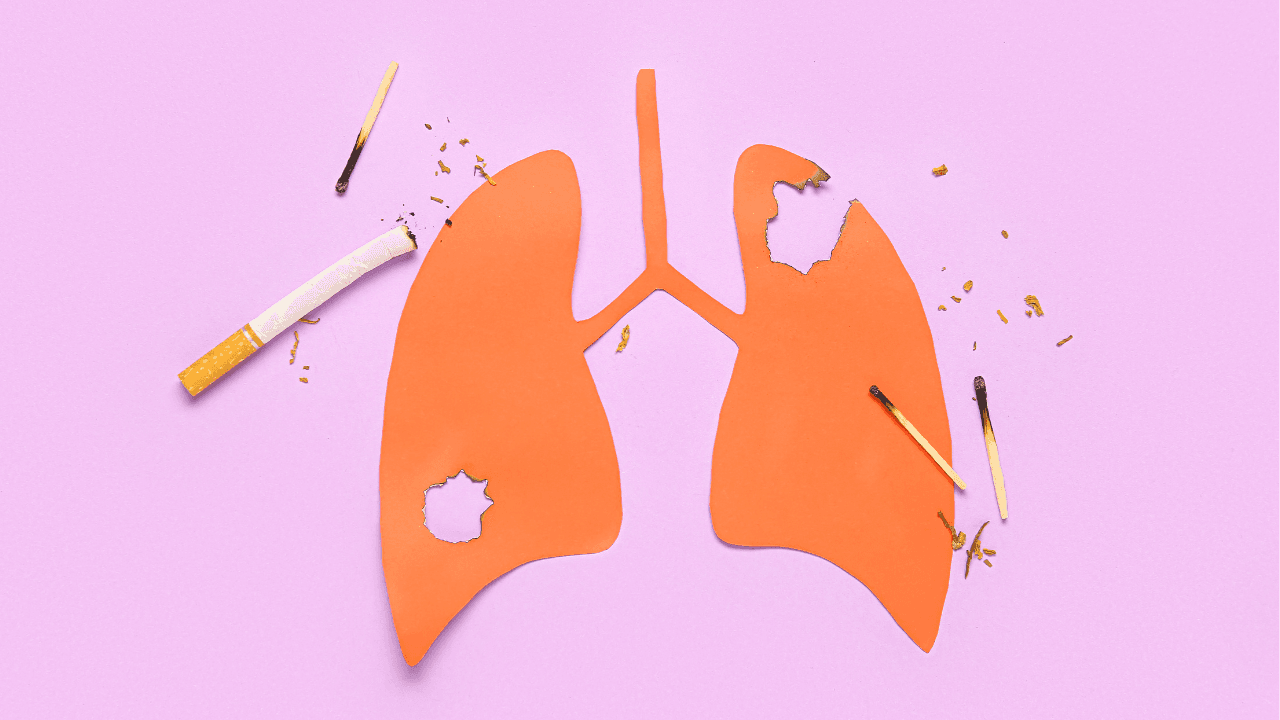“Smoking Habits and Lung Cancer: Understand the Risks and Protect your Lungs”

Lung cancer is one of the most severe forms of malignant diseases and is a leading cause of death
worldwide. One of the most significant risk factors associated with the development of this disease is smoking, both
active and passive. In this blog post, we will explore the impact of smoking on the development of lung cancer and highlight
the risks associated with passive smoking.
Active Smoking
Active smoking is the most common cause of lung cancer. Research has shown that smokers have a significantly
higher risk of developing this type of cancer compared to non-smokers. Cigarette smoke contains numerous
carcinogenic substances, including benzene and formaldehyde. These substances damage DNA in the lungs, which
can lead to uncontrolled cell division – the basis of tumor growth.
Smokers are also exposed to various other health risks, including chronic lung diseases and heart diseases, which further complicate their overall health condition. Although reducing the number of cigarettes smoked can lower the risk, the best solution is to quit smoking entirely to
drastically reduce the risk of lung cancer.
Passive smoking
Passive smoking, or exposure to secondhand smoke, poses similar
health risks to non-smokers who live or work in environments where they are exposed to cigarette smoke. Studies confirm that passive smoking can also cause various diseases, including lung cancer.
Active Smoking
Active smokers are also exposed to various other health risks, including chronic lung diseases
. While reducing the number of cigarettes smoked can lower the risk, the best solution is to quit smoking entirely to
drastically reduce the risk of lung cancer.
Passive Smoking
Passive smoking, or exposure to cigarette smoke by non-smokers, can cause similar
various diseases, including lung cancer.
Caring for non-smokers is crucial: proper ventilation, banning smoking in public spaces, and generally reducing tobacco use can significantly reduce the risk for everyone.
Good Habits for Smokers
Smokers can adopt several daily habits to reduce the risk of lung cancer and improve their overall health:
1. Regular Health Check-ups: Visit your doctor regularly to monitor your health. Early detection of potential problems can be crucial. Pay attention to symptoms such as persistent cough, shortness of breath, or frequent respiratory infections.
2. Physical Activity: Engage in physical activities to improve lung health and overall well-being. Aim for at least 150 minutes of aerobic activities, such as walking, running, or swimming, each week.
3. Avoid Secondhand Smoke Exposure: If you are a smoker, avoid exposing non-smokers, especially children and pregnant women, to cigarette smoke.
who live or work in environments where they are exposed to cigarette smoke face similar
risks as active smokers. Research confirms that passive smoking can also cause
various diseases, including lung cancer.
Children, pregnant women, and individuals with pre-existing health issues are particularly vulnerable to the negative effects
of passive smoking. Caring for non-smokers is crucial: properly ventilated spaces, banning smoking in
enclosed areas, and generally reducing tobacco use can significantly lower the risk for everyone.
Good habits for smokers
While the best solution is to quit smoking entirely, there are certain good habits that smokers can
adopt in their daily lives to reduce the risk of lung cancer and improve their overall health:
1. Regular medical check-ups: Visit your doctor regularly to monitor your health. Early detection
of potential problems can be crucial. Pay attention to symptoms such as severe
shortness of breath, coughing up blood, or frequent respiratory infections.
2. Physical activity: Exercise can help improve lung capacity and overall health. Try
to engage in aerobic activities, such as walking, running, or swimming, for at least 150 minutes a week.
3. Healthier diet: Increase your intake of fruits and vegetables rich in antioxidants, which can help strengthen
the immune system and reduce inflammation. Omega-3 fatty acids from fish and nuts can also
provide additional protection.
4. Avoid secondary smoke exposure: If you are a smoker, try not to smoke in enclosed
spaces and around non-smokers, especially children and pregnant women.
5. Taking vitamin D supplements: There is increasing evidence suggesting that vitamin D may help reduce the
risk of lung cancer. Smokers often have lower levels of vitamin D, so considering
supplementation or a diet rich in this vitamin may be beneficial.
Conclusion
The link between smoking and lung cancer is well-documented and scientifically confirmed. Through active and passive
smoking, we reduce our quality of life and increase the risk of serious health problems.
Therefore, to support your health and reduce risk, order one of our Zeleni Sokovi
Nemet products, which have an exceptional preventive effect against lung cancer!










